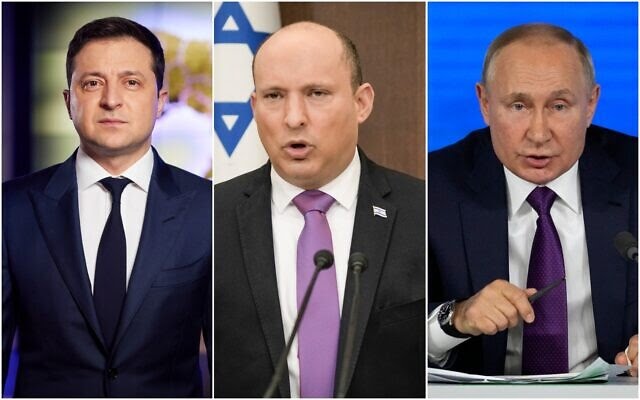By Dan Williams
Israel will continue trying to mediate between Russia and Ukraine even if success seems unlikely, Prime Minister Naftali Bennett said on Sunday after returning from surprise talks with Russian President Vladimir Putin.
Ukraine has requested that Israel serve as intermediary, citing the Bennett government’s good relations with both Kyiv and Moscow. Bennett’s office said he spoke three times over the weekend with Ukrainian President Volodymyr Zelenskiy.
In televised remarks to his cabinet, Bennett gave no details on his three-hour Kremlin meeting with Putin on Saturday, saying only that it had “the blessing and encouragement of all parties” – an allusion to the United States, among other powers. Bennett and Putin had discussed the mediation idea by phone last week.
“We will continue to assist wherever this is requested, even if the chances are not great,” Bennett said. “The moment there is even a small opening, and we have the access to all sides and the capability, I see it as a moral duty to make every attempt.”
Israel has condemned the Russian invasion of Ukraine, expressed solidarity with Kyiv and sent humanitarian aid. But Bennett has not met Ukrainian requests for military assistance and has kept channels open to Russia, with which Israel coordinates operations against Iranian deployments in Syria.
Israeli Communications Minister Yoaz Hendel said he had declined Ukrainian requests to ban nine Russian media outlets on the grounds they were propagandising.
“These (broadcasters) did not meet any kind of threshold that would necessitate their blocking. I would like to remind you that, in a democracy, blocking media channels is a very dramatic event,” Hendel told reporters.
Interior Minister Ayelet Shaked said Israel, which has a population of 9.2 million, was bracing for a “very, very big wave” of immigration sparked by the conflict.
This could entail taking in more than 200,000 Ukrainians who are Jewish or have Jewish family links and more than 600,000 Russians in the same categories, she said.
In what local media have cast as a bid to prevent Russian oligarchs from fleeing to Israel to evade sanctions, the Israel Airports Authority said it had received instructions not to allow private jets to park for more than 24 hours.
Credit | Reuters

